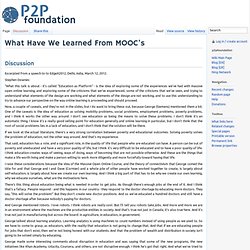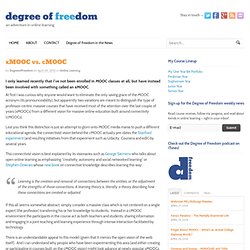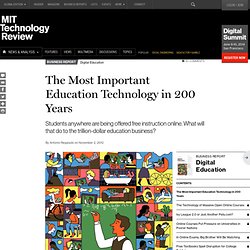

What is a MOOC? What Have We Learned From MOOC's. Excerpted from a speech to to EdgeX2012, Delhi, India, March 12, 2012.

Stephen Downes: "What this talk is about - it's called "Education as Platform" - is the idea of exploring some of the experiences we've had with massive open online learning, and exploring some of the criticisms that we've experienced, some of the criticisms that we've seen, and trying to understand what elements of the design are working and what elements of the design are not working, and to use this understanding to try to advance our perspective on the way online learning is proceeding and should proceed. Now, a couple of caveats, and they're not in the slides, but I do want to bring these out, because George (Siemens) mentioned them a bit. One of the caveats is the idea of education as solving mobility problems, social problems, employment problems, poverty problems, and I think it works the other way around.
I don't see education as being the means to solve these problems. And George mentioned robots. Well. xMOOC vs. cMOOC - MOOC Pedagogy. I only learned recently that I’ve not been enrolled in MOOC classes at all, but have instead been involved with something called an xMOOC.

At first I was curious why anyone would want to eliminate the only saving grace of the MOOC acronym (its pronounceability), but apparently two variations are meant to distinguish the type of professor-centric massive courses that have received most of the attention over the last couple of years (xMOOCs) from a different vision for massive online education built around connectivity (cMOOCs). Lest you think this distinction is just an attempt to glom onto MOOC media mania to push a different educational agenda, the connectivist vision behind the cMOOC actually pre-dates the Stanford experiment (and resulting initiatives from that experiment such as Udacity, Coursera and edX) by several years.
Learning is the creation and removal of connections between the entities, or the adjustment of the strengths of those connections. 1. 2. 3. 4. 5. The ABCs of MOOCs: What It's Like to Enroll. Coursera, edX, and MOOCs Are Changing the Online Education Business. If you were asked to name the most important innovation in transportation over the last 200 years, you might say the combustion engine, air travel, Henry Ford’s Model-T production line, or even the bicycle.

The list goes on. Now answer this one: what’s been the single biggest innovation in education? Don’t worry if you come up blank. You’re supposed to. The question is a gambit used by Anant Agarwal, the computer scientist named this year to head edX, a $60 million MIT-Harvard effort to stream a college education over the Web, free, to anyone who wants one. Agarwal believes that education is about to change dramatically. Online education isn’t new—in the United States more than 700,000 students now study in full-time “distance learning” programs. These ideas affect markets so large that their value is difficult to quantify. In Christensen’s view, disruptive technologies find success initially in markets “where the alternative is nothing.” Digital instruction faces limits. MOOC Killer Apps: The Autograder vs. The Syndication Engine - EdTech Researcher.